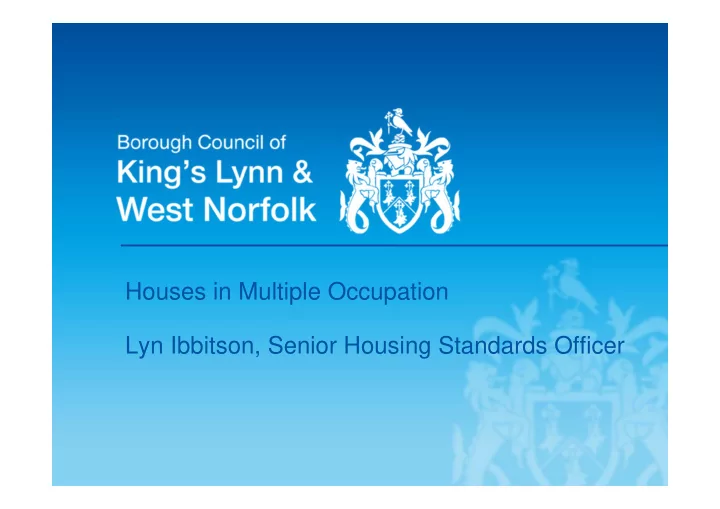

Houses in Multiple Occupation Lyn Ibbitson, Senior Housing Standards Officer
Definition of an HMO – Housing Act 2004 • Most Houses in Multiple Occupation are properties rented out to 3 or more people who do not form the same household and share facilities such as a bathroom or kitchen; • There are other HMOs including some buildings converted into flats; • A detailed definition can be found in the Housing Act 2004 s254-259
Mandatory licensing of HMOs HA 2004 – the current situation • Five or more people forming more than one household • At least three storeys • The occupants share toilet, bathroom or kitchen facilities • Currently we have 30 licensed HMOs
HMO Management Regulations • Adequate facilities for the level of occupancy • Windows and bannisters in good repair • Clean communal areas • Regular testing of gas and the electrical system • Overcrowding • We risk assess the frequency of inspections
Standards that apply in HMOs HHSRS – 29 hazards e.g. (6) Carbon monoxide (1) damp and mould, and (2) Excess cold
HHSRS - overcrowding (11) Overcrowding
Standards that apply to all • Safe electrics
HHSRS-apply to all properties incl. HMOs Falls between levels
Shower in a larder
Receptacles strategically placed to catch rainwater
What’s behind the square window today?
A horse on the roof!
The HMO Licensing process • Application completed, information supplied • Validation (of documents provided) • Check ownership, planning • Assess the proposed management arrangements • Issue a draft licence (consultation period) • Right of appeal
Identifying HMOs – how do we find them? • Via officers from other departments • Neighbour’s complaint • Tenant’s complaint • Noise/ASB • Extra bins being requested • Police, Fire Service, Gangmaster and Labour Abuse Authority, Immigration • Facebook, Gumtree!
HMO investigations • Check any history on the property • Create a new record and log info • Officer makes contact to check on signs of multi-occupancy • Visit and assess whether licensable or not • If licensable, owner advised of process • Officer, if able to assess the property condition, advise, take appropriate action
Ministry of Housing, Communities and Local Government* • Housing is back on the agenda at Cabinet level, and for the first time since 1970, housing appears in the title of the department and the title of the Secretary of State responsible for it, Sajid Javid. • * formerly DCLG
Government review of HMO licensing … what is coming • HMO licensing has had a positive impact on improving conditions in larger properties, but growth in the market has led to some smaller properties being let that fall outside the parameters of licensing; • Expanding licensing will uncover any landlords letting properties below an acceptable standard and help to enable councils to require improvements;
Government proposals: to extend mandatory HMO licensing to include: • 5 unrelated occupiers – not dependent on having 3 storeys • Self-contained flats (with 5 occupiers) • Minimum sleeping room size 6.5m 2 • Detailed definitions, effective date and guidance awaited (probably April)
HMO upstairs from restaurant
Plug socket behind the same bed with an extension lead on an extension lead
HMO above another restaurant Stairs from 1 st to 2nd very steep uneven treads no handrail lino longer than the tread Window at the top only No artificial lighting
A successful prosecution…
not an HMO but…
unfortunately this is how some live
Fire in an HMO
This HMO became a squat
Homes (Fitness for human habitation) • The government stated recently that it is going to support Karen Buck MP’s Private Member’s Bill which requires that properties to be fit when they are let. • It amends the Landlord and Tenant Act 1985 • and the Building Act 1984 • Tenants will be able to take their own action. The second reading was on 19 th January. •
Changes affecting bad landlords • Civil Penalties – up to £30,000 (money to the Council, not the Court) • Rent Repayment Orders – up to 12 months’ rent returned to tenant (or Council) • Banning Orders – where a landlord with a poor track record can be regarded as not Fit & Proper not just for housing offences but those involving offences unrelated to housing
Minimum Energy Efficiency Standards • MEES Regs – working towards rented properties only being rented out with satisfactory thermal insulation • From April 18 for a new tenancy, a property should be rated an E on an Energy Performance Certificate (EPC) • Bedsits don’t require EPCs unless the building had previously been assessed. But a self contained flat within an HMO with shared facilities etc. does need one.
Boo
Poo
Housing and Planning Act … • Insert the following new Clause— “ Electrical safety standards for properties let by private landlords • • in relation to— • (a) the installations in the premises for the supply of electricity, or • (b) electrical fixtures, fittings or appliances provided by the landlord. • (3) The duties imposed on the landlord may include duties to ensure that a • qualified person has checked that the electrical safety standards are met. • (5) The regulations may require the landlord— • (a) to obtain a certificate from the qualified person confirming that • electrical safety standards are met, and • (b) to give a copy of a certificate to the tenant, or a prospective tenant, or • any other person specified in the regulations. •
Property owners overseas
Any questions?
Recommend
More recommend